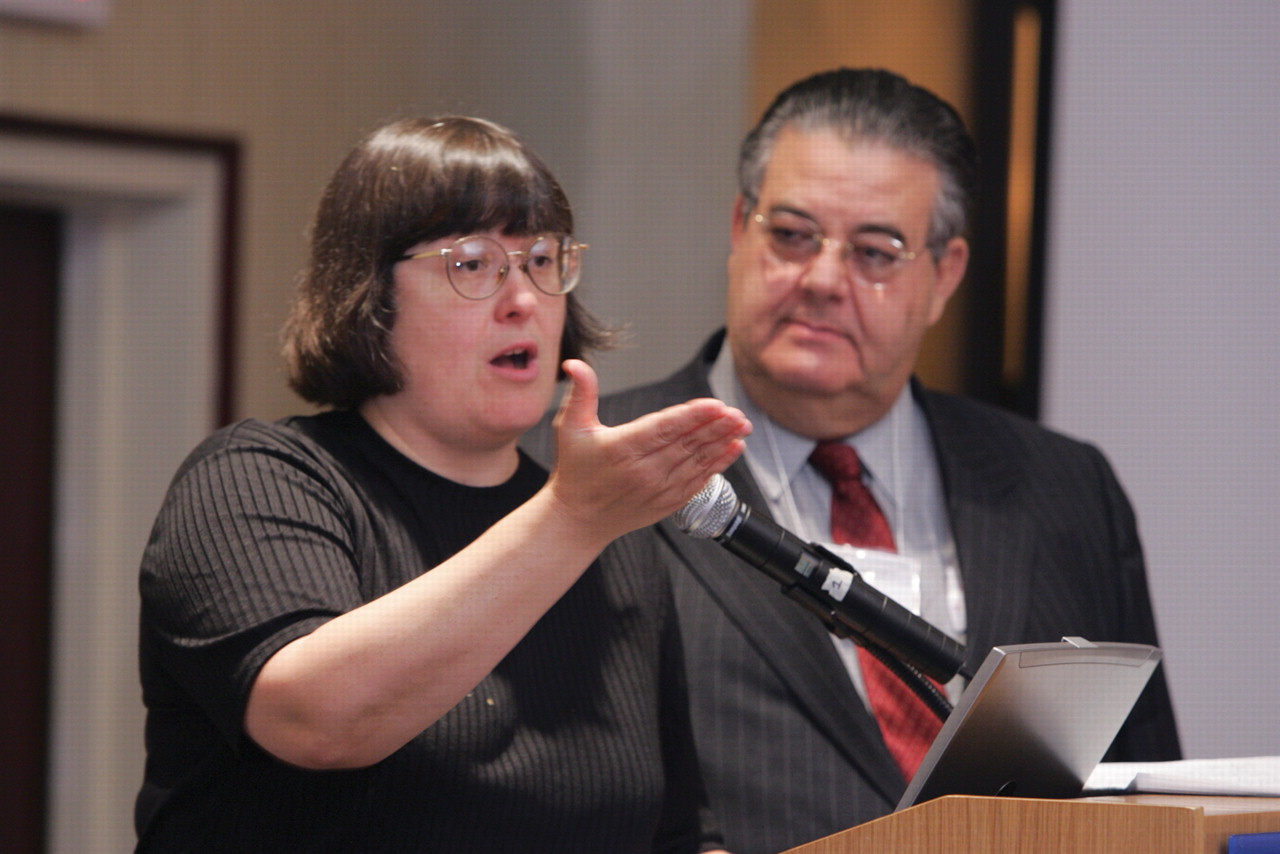Psychiatrists Hold Key To Open Doors on Hill
Various speakers at APA's fall component meetings last month in Washington, D.C., encouraged psychiatrists to become politically active for their profession and patients. Attempts to influence state and federal legislators are the only way to mitigate the impact of the ever-increasing influence that government officials exert over medicine, they said.

Suzanne Vogel-Scibilia, M.D., president of the National Alliance on Mental Illness (NAMI), tells APA members last month in Washington, D.C., that APA and NAMI should collaborate more closely on such efforts as seeking funding to implement recommendations of the New Freedom Commission on Mental Health. At right is APA President Pedro Ruiz, M.D. (see pages 2 and Original article: 13).
David Hathcox
At a luncheon during the fall meetings, Rep. Charles Norwood (R-Ga.) told attendees that physicians need to be involved “to protect the patients in this country from an increasing third-party presence.” The dentist and cosponsor of federal mental health parity legislation told attendees that many members of Congress are either uninterested in health care or concerned only with its financial impact on the federal budget.
Develop Relationships
He urged psychiatrists to develop personal relationships with their representatives through contributions and offers to work on their campaigns and be a resource they can consult on health care issues.
“Members of Congress actually listen to their constituents if they see them eyeball to eyeball,” Norwood said. “It's important to get people on your side who [have the power to] ruin your profession with the stroke of a pen.”
Norwood called on physicians to help elect or reelect state and federal legislators who support physicians' positions on health care issues by contributing annually to their campaign funds.
Norwood said his “number-one priority” for the remainder of the current congressional session is to get other members to join him in overriding the planned 5.1 percent cut in Medicare physician reimbursement scheduled to take effect in January 2007 (see Original article: page 17).
The plea to psychiatrists to get involved in the political process was repeated during the plenary session of the fall meetings. APA President-elect Carolyn Robinowitz, M.D., told attendees that APA attempts to develop relationships with members of Congress from across the political spectrum to ensure continuous influence. The lobbying effort is a years' long“ complex process,” similar in length and complexity to the care that psychiatric patients require, she said.
Participate in APAPAC
Critical to the success of APA's lobbying efforts is the participation of its members in APA's political action committee, APAPAC. Its membership has increased from 1,472 in 2001-2002 to 2,579 in 2005-2006. ApaPAC supported about 135 members of Congress in the current cycle, with the support almost evenly split between the two major political parties (see Original article: page 3).
“We have to counter the Scientologists and their well-funded message to Congress,” Robinowitz said. “We've got to educate; we've got to lobby.”
APA also can increase its political profile and advocacy impact by partnering with organizations that have many of the same views, said Suzanne Vogel-Scibilia, M.D., president of the National Alliance on Mental Illness (NAMI). She proposed a collaborative relationship to spur action on the state and federal level. Such a “partnership” could push for federal funding for the recommendations of the President's New Freedom Commission on Mental Health, among other initiatives.
APA President Pedro Ruiz, M.D., said the collaboration would help cement relationships between APA and patient advocacy groups. He highlighted various areas in which APA might benefit from such collaboration and urged component members to consider issues on which they could collaborate with patient advocacy groups.
Vogel-Scibilia discounted the notion that implementation of the New Freedom Commission's recommendations was held up by erroneous claims that the commission was mandating child mental health screenings. The problems affecting the delivery of high-quality mental health care are so complex, and each state uses such different systems, that no one has been able to push through the changes needed.
“If we have a strong partnership, then we can push people in government to make decisions that are politically unpopular,” she said.
The proposed alliance would be a change from the current mental health alliance in Washington, D.C., of 16 advocacy groups that Vogel-Scibilia described as somewhat like “herding cats.” Better results would be possible, she said, if two or three of the most powerful mental health groups provided a more unified push on issues.
In response to a question from a member of the audience, Vogel-Scibilia said the dysfunction of the current mental health system led to the chain of circumstances that allowed a patient of Wayne Fenton, M.D., to allegedly bludgeon him to death in his office (see Original article: page 1).
“When the system is broken, it is we as providers who are trying to help who are in danger,” Vogel-Scibilia said.
She said the tragic event should spur psychiatrists to push for improvements in the system.
The need for government action in a health care crisis also was highlighted by a presentation at the plenary session on the 25 years since the first U.S. Cases of AIDS appeared. Marshall Forstein, M.D., who chaired the APA commission on AIDS for 12 years, traced the AIDS epidemic from its earliest days in this country and highlighted the points when the public and the federal government finally confronted the disease and took steps to control it.
Although the government's early approach to largely ignore the disease showed how destructive an unchecked health care crisis can be, Forstein said, government research funding was eventually critical to understanding and treating the disease.
Forstein told psychiatrists that the mental health consequences of the AIDS epidemic among those with the disease and their families and friends will be felt for many years, and they should be ready for these patients.
“if there was ever a disease that truly needs a combined biopsychosocial approach, this is it,” he said. ▪



